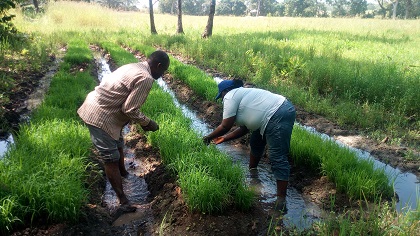Making IFAD’s field work more gender transformative
9 February 2022

The International Fund for Agricultural Development (IFAD) has opened a new route to advance the gender transformative agenda for food security and poverty eradication. In the closing days of 2021 the Fund launched the first of a series of technical webinars aiming to support the scale-up of gender transformative activities within its project portfolio though practical how-to-do sessions targeting managers, experts and practitioners in charge of IFAD’s initiatives across the Global South.
The Changing Lives Series is being organized in the framework of the Joint Programme on Gender Transformative Approaches for Food Security and Nutrition (JP GTA), an initiative implemented by the three United Nations Rome-based Agencies (RBAs) – FAO, IFAD and WFP – in collaboration with and through financial support from the European Union.
To kick off the series, on 15 December 2021 the Technical Lab on Gender Transformative Programming introduced definitions and key concepts of gender transformative programming as well as a methodology for integrating gender transformative activities in food security and nutrition interventions. This first webinar brought together 69 people from 35 different countries, most of whom working in the field as IFAD project staff, experts, or implementing partners.
“We are pleased to propagate the gender transformative thinking throughout IFAD’s work on the ground. With the Changing Lives Series, we are reaching those who can take impactful actions, paving the way to address the root causes of gender inequalities in rural settings,” said Ndaya Beltchika, IFAD’s Lead Technical Specialist for Gender, Targeting and Social Inclusion.
In the initial webinar, Hajnalka Petrics, the JP GTA Global Coordinator, presented the Theory of Change (ToC) for gender transformative programming for food security and nutrition, which has been developed, piloted and refined by the Joint Programme since early 2020. “Following the ToC, the turning point to address food and nutrition insecurity is when organizations design and implement programmes and projects that include gender transformative components, combining interventions at multiple scales, across individual and systemic levels, and in both formal and informal spheres of life,” stated Ms. Petrics.
The event also showcased good practices from projects that won the latest IFAD’s Gender Awards, an annual prize given by the Fund to initiatives that best meet the objectives of its Policy on Gender Equality and Women’s Empowerment. The awarded cases included Kenya’s Upper Tana Catchment Natural Resources Management Project (UTaNRMP) and Nigeria’s Value Chain Development Programme (VCDP).
“It was a very informative webinar,” said one participant, echoing the feedback provided by many participants in a post-event survey. “This series is a good initiative that helps us improve our learning and implement the gender transformative approaches in our projects,” added another participant.
The forthcoming sessions of the series will cover the following topics: 1) gender mainstreaming versus gender transformative projects; 2) integrating the Gender Action Learning System (GALS) and household methodologies in the project cycle of IFAD investments, 3) measuring gender transformative impacts (e.g. social norms indicators, empowerment indicator etc.), thematic theories of change and more.
To learn more:
- JP GTA website: https://www.fao.org/joint-programme-gender-transformative-approaches/
- JP GTA flyer (in English): https://www.fao.org/publications/card/en/c/CB7065EN
- JP GTA flyer (in Spanish): https://www.fao.org/publications/card/es/c/CB7065ES
Contacts:
- Silvia Sperandini, IFAD Member of the JP GTA Technical Advisory Committee: [email protected]
- Hajnalka Petrics, Global Coordinator of the JP GTA: [email protected]
- JP GTA: [email protected]




